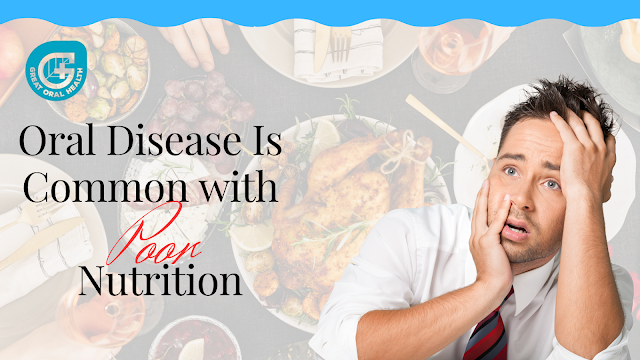Maintaining good oral health is crucial for our overall well-being. Proper nutrition plays a key role in preventing oral diseases, as well as other health issues. In this article, we will explore the link between nutrition and oral health, and identify which oral disease is commonly associated with poor nutrition.
Introduction
Oral health is an essential component of our overall
well-being. Our mouths are home to millions of bacteria, and maintaining good
oral hygiene is critical to keeping these bacteria under control. However, the role
of nutrition in oral health is often overlooked. Poor nutrition can lead to
a range of health problems, including oral diseases.
The importance of vitamins and minerals
Vitamins and minerals play a crucial role in maintaining
good oral health. Calcium, for example, is essential for the development and
maintenance of strong teeth and bones. Vitamin D is also important, as it helps
the body absorb calcium.
Other important vitamins and minerals for oral health
include vitamin C, which helps to prevent gum disease, and phosphorus, which
helps to strengthen teeth. A diet that is rich in fruits, vegetables, and lean
proteins can provide the necessary vitamins and minerals for good oral health.
Which oral disease is common with poor nutrition?
One oral disease that is commonly associated with poor
nutrition is periodontal disease, also known as gum disease. Gum disease is a
bacterial infection that affects the tissues and bones that support the teeth.
Research has shown that poor nutrition, particularly a diet
that is high in sugar and processed foods, can increase the risk of gum
disease. Inflammation in the body caused by a poor diet can also contribute to
the development of gum disease.
The Role of Sugar in oral health
Sugar is a major contributor to poor oral health. Bacteria
in the mouth feed on sugar, producing acid that can erode the enamel of the
teeth and lead to cavities. A diet that is high in sugar, particularly sugary
drinks and snacks, can increase the risk of tooth decay and other oral health
problems.
The impact of processed foods on oral health
Processed foods are often high in salt, unhealthy fats, and
added sugars. These foods can increase the risk of inflammation in the body,
which can contribute to the development of gum disease.
Processed foods can also be low in the vitamins and minerals necessary for good oral health. A diet that is high in processed foods can lead to a deficiency in important nutrients like calcium and vitamin C, which can weaken the teeth and gums.
Read More: Nutrition Contributes to Poor Oral Health
Strategies For Improving Nutrition and oral health
1. Reduce sugar intake: One
of the most effective ways to improve oral health is to reduce sugar intake.
This means limiting sugary snacks and drinks and choosing healthier
alternatives like fruits and vegetables.
2. Choose nutrient-rich foods: Eating a balanced diet that is rich in vitamins and
minerals is essential for maintaining good oral health. Foods like leafy
greens, nuts, and lean proteins can provide the necessary nutrients for healthy
teeth and gums.
3. Drink plenty of water: Drinking water can help rinse away bacteria and food
particles that can contribute to tooth decay and gum disease. Water also helps
to keep the mouth hydrated, which can prevent dry mouth and other oral health
problems.
4. Avoid processed foods: Processed foods are often high in salt, unhealthy fats,
and added sugars, which can increase the risk of inflammation in the body and
lead to gum disease. Choosing whole, unprocessed foods can help improve oral
health.
5. Practice good oral hygiene: Brushing twice a day, flossing daily, and using
mouthwash can help keep teeth and gums healthy. Regular dental check-ups are
also important for maintaining good oral health.

Comments
Post a Comment